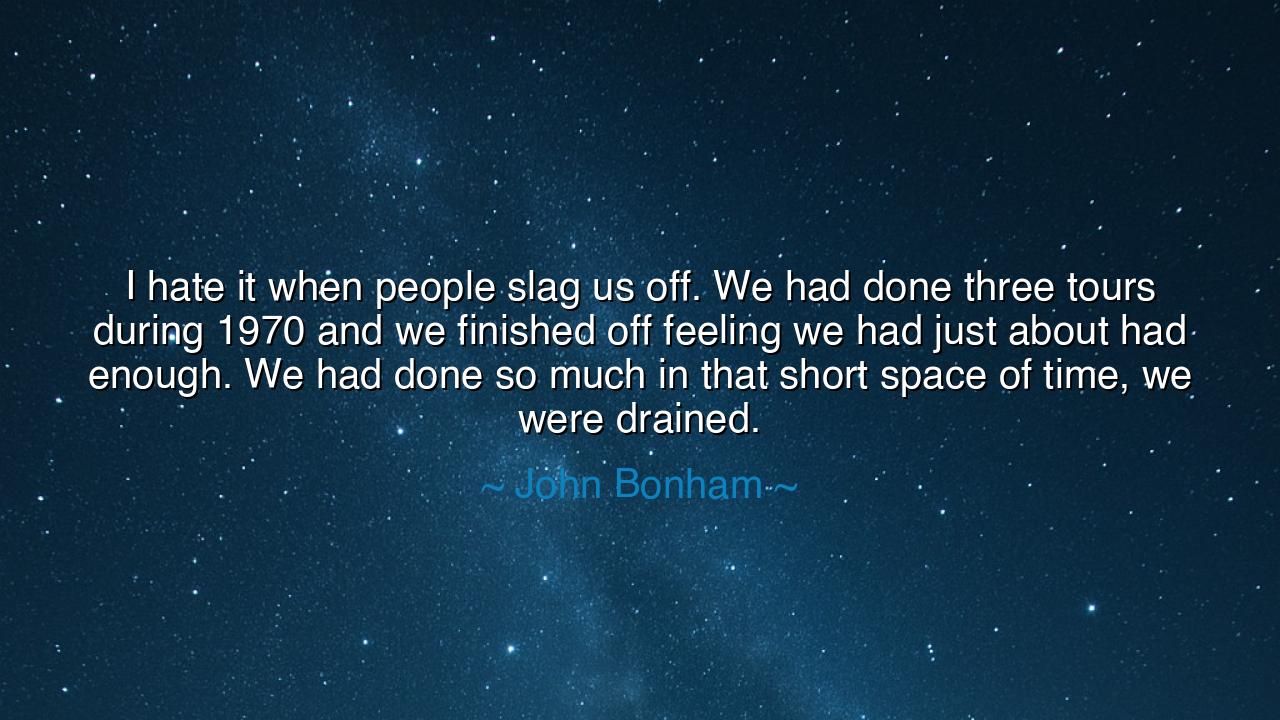
I hate it when people slag us off. We had done three tours during
I hate it when people slag us off. We had done three tours during 1970 and we finished off feeling we had just about had enough. We had done so much in that short space of time, we were drained.






Hear now, O Children of the Earth, the words of John Bonham, the mighty drummer whose heartbeat echoed through the halls of Led Zeppelin: "I hate it when people slag us off. We had done three tours during 1970 and we finished off feeling we had just about had enough. We had done so much in that short space of time, we were drained." These words, spoken by one who felt the weight of creativity and struggle, remind us of a truth that resonates through the ages: that the pursuit of greatness is often both a blessing and a burden. The path to legendary achievements is not paved with ease, but with tireless effort, sacrifice, and, at times, exhaustion.
In the ancient world, heroes and gods were often depicted as beings who could endure anything, as though they were untouched by the hardships of the mortal realm. But this, O Seekers, was not the whole truth. For even in the grand stories of old, there is pain behind the glory, suffering beneath the triumph. Consider the tale of Hercules, the mighty hero, who faced twelve labors that seemed impossible, only to find that each victory brought him closer to a profound weariness, an exhaustion that tested his very soul. And yet, like Hercules, John Bonham and his bandmates faced the trials of endless performance, their bodies and spirits drained from the relentless pursuit of their craft. The gods too, though immortal, knew the weight of their own burdens.
The years of 1970 were not kind to the band, for they had traveled the world, sharing their music with the masses, pouring their hearts into every performance. The exhaustion Bonham speaks of is the toll that the relentless pursuit of greatness takes on those who dare to give all they have. The toll is heavy, and it is often overlooked by those who see only the shiny exterior, the fame, the applause. But behind the scenes, the soul that gives without rest grows weary, the spirit that strives for perfection begins to crack under the weight of its own ambition. This is the truth Bonham shares with us—drained, at the end of an exhausting journey, when the work feels both endless and thankless.
Yet, no path of greatness is free from sacrifice. In ancient times, the great architects, such as Phidias, who built the grand statues of the gods, or Leonardo da Vinci, who painted the heavens and the earth, were often drained by the sheer magnitude of their work. Their hands, though gifted, were worn by the effort, their minds burdened by the vision they sought to create. Bonham and his bandmates knew this truth—greatness requires not only talent but endurance, the willingness to push beyond the limits of the human spirit, even when the body cries out for rest.
Let us also remember, O Seekers, that the public eye often fails to see the true nature of the artist’s journey. The critics, those who stand on the sidelines, seldom understand the full cost of what is given. They see only the outcome—the music, the performance, the spectacle—but not the sacrifice behind it. Bonham felt the sting of this judgment, the frustration that comes when the effort of the artist is misunderstood, when those who slag them off fail to see the sacred labor that has been poured into their craft. Greatness, whether in music, art, or life, demands a certain degree of understanding, for without it, the weight of criticism can feel crushing.
In the same way, O Seekers, you will find that those who achieve the most often face the greatest burdens. The work that you are called to—whether it is the work of the mind, the hands, or the soul—will require much from you. And in moments of exhaustion, when the world seems heavy, remember that even the greatest have felt this way. Take heed of Bonham’s words, for they remind us that the pursuit of greatness is not an easy path, but one that requires resilience, passion, and the courage to continue even when the body is weary and the soul feels empty.
The lesson, O Children, is this: while we strive for excellence, we must also honor the sacrifice that comes with it. Know that exhaustion is not a sign of weakness but a sign of dedication. And when the critics rise, remember that their words are fleeting, but the work of your hands and the strength of your heart are eternal. Stand firm, even when the journey seems too long and the burdens too heavy, for it is in these moments that your true strength is forged. Like Bonham, you too will find that even in the drain, there is power—power that will carry you through to the next challenge, to the next victory, and to the next great achievement.






AAdministratorAdministrator
Welcome, honored guests. Please leave a comment, we will respond soon